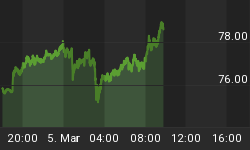What a ride the precious metals have been on recently. Gold and silver prices have fallen off a cliff, while gold stocks were thrown on the rocks and left for dead. GLD has seen record outflows.
Popular financial news shows featured guest after guest who proclaimed gold is now "officially" in a bear market, emboldened by the fact that in spite of its recent bounce, the price has languished below its September 2011 peak for 20 months. As a group, gold stocks are down an abysmal 54% over that same period. The capitulation process has been brutal.
So, were we wrong? Is it time to admit defeat, sell our positions, slink into a cave, and lick our wounds?
Absolutely not.
The only thing that changed over the past 60 days was the price of gold, and perhaps the mainstream's perception of our industry. The realities of the fiscal and monetary state of the world, however, did not.
What has struck our industry was not the consequence of a shift in fundamentals, but rather a number of transient factors, including: (i) growing belief in the general investment community that inflation will not result from global money-printing efforts; (ii) claims the global economy is improving; (iii) Europeans fleeing their economic troubles buying US dollars (which makes the dollar look strong and hence gold less appealing to some); and (iv) a very large gold sale that caused the gold price to breach "technical support levels" and trigger a cascade of further selling. All of this - and a lot of commentary based more on opinion than fact - has led to the misguided conclusion that gold is a has-been asset.
Casey Research readers know we think inflation is inevitable, but even if deflation were more likely, it is the fallout from a world living beyond its means in which most major central banks are massively debasing their currencies in an attempt to prop up ailing economies that worries me.
These stimulus policies are unprecedented in scale, entirely unsustainable, and induce financial-system instability. And somehow, it is widely believed that the same policymakers who concocted this mess can get us out of it. Our views haven't changed - yet suddenly, we're contrarians again.
It takes patience and courage to stay the course amid a groundswell of proclamations that the "gold trade is dead," but our positive outlook isn't based on stubbornness. The evidence from history is very clear: you cannot solve debt problems with more debt, nor strengthen an economy by destroying your currency. Eventually, these sins catch up to you.
Today's ongoing economic and fiscal crises cannot end smoothly or without unpleasant consequences. Since none of the excesses that precipitated the 2008 financial crisis have been fixed, another round of crisis is baked in the cake and will likely inflict even greater damage. When that happens, gold will again be seen as the refuge it is, regardless of current popular opinion.
We're not alone in this thinking. As you've undoubtedly read, in response to the crash, global demand for physical metal soared at both the retail and wholesale levels. This reaction is extremely important: we can't identify a single crash, collapse, or crisis that ended with retail investors stampeding to buy the asset that had just been crushed. Not one.
In our view, the gold story is not over. Far from it. The reasons for owning it are just as important now as they've ever been since the bull market started in 2001. I can't be sure the price is done falling - but I'm sure it's not done climbing.
What is going on with gold? Was it overvalued before the recent drop? Or is the price being manipulated? Is now the time to get in, and if so, how? These are just a few of the questions investors want answered. And while no one has a crystal ball that issues definitive answers, some people have been around long enough to have keen insights on what's happening and what's likely to happen from here.
People like Doug Casey, legendary speculative investor... Eric Sprott, founder and chairman of Sprott Inc... and Steve Feldman, former Goldman Sachs partner and cofounder of Gold Bullion International. Casey Research and TheStreet have teamed up to bring these great minds together, along with others, to discuss the questions asked above, and many more. You can hear their answers - and more important, get their actionable advice on what to do now to best position yourself for what's ahead with gold - in an exclusive video event titled Gold: Dead Cat or Raging Bull? The webinar will be held Tuesday, June 25 at 2:00 p.m. EDT. Reserve your spot now.















